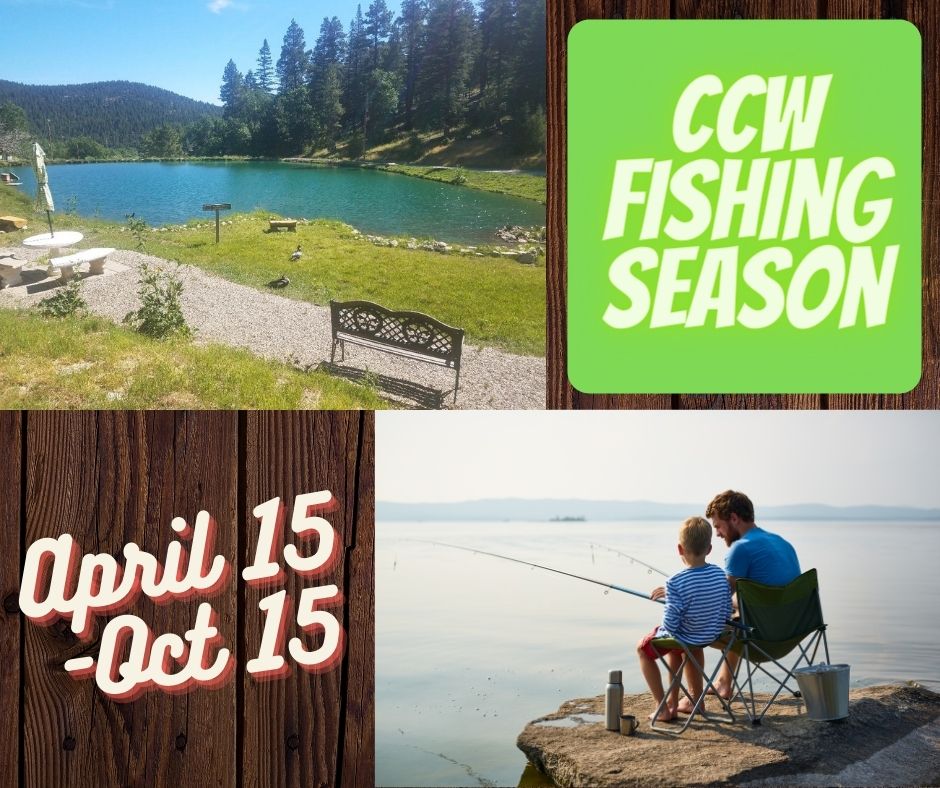Fishing Season April 15-October 15
The goal of the CCW POA #1 Pond Committee is to establish rules that will ensure the longevity of pond fishing for generations to come. With your help and with conservations efforts, we hope to create a self-sustaining system that will provide years of enjoyment for our community. We encourage you to have fun, utilize safe fish handling techniques while promoting catch and release policies.
Paul Bracken (915)491-8468 can issue permits for the 2023 Fishing Season, monitor pond, maintain records, and answer any questions you may have.
Paul Bracken (915)491-8468 can issue permits for the 2023 Fishing Season, monitor pond, maintain records, and answer any questions you may have.
Rules for Fishing
- 1. Fishing season will be from April 15th through October 15th.
- Annual fishing permit fee will be $50 per household (These fees are used for re-stocking pond and fish food).
- Only “barbless” hooks are allowed for fishing in our pond (Crimp, or use a Dremel tool to remove the barb on hooks), this reduces possible damage to the mouth of the fish and almost always makes it easier, and quicker, to unhook your catch. A barbed hook is also not fun to remove if it happens to find human flesh.
- Seasonal bag limit will be twelve (12) fish per household. You are encouraged to keep any fish 18 inches or longer (these larger fish will not count against your season limit), as they may be reaching the end of their life cycle. Any fish “kept” over the season limit of 12, not including fish 18” or longer, will be assessed a restocking fee of $10.
- Permits are for homeowner’s and family only (no renters).
- Children must be supervised by an adult at all times.
- When actively fishing, permit must be in possession of the angler and displayed.
- Anglers are required to record the number of fish caught and released, and/or caught and kept on the log sheet provided in mailbox at the pond.
- Absolutely no cleaning of fish at or near the pond or stream.
- Pond area should be always be left clean, please pick up any trash that you may find.
- Abuse of these rules may result in the loss of fishing privileges.
Safe Trout Handling Techniques
- NEVER put your fingers in the gills of a fish unless you plan to ethically kill and keep your fish. Trout are very delicate, and this will do incredible damage to your fish.
- WET your hands prior to handling fish. Trout (and other fish species) have a protective slime coating that is removed by dry hands. Again, unless you plan to dispatch said catch ethically and keep it, wet your hands before handling. Using a specialized tailing glove helps improve your grip, and protect the fish.
- USE barbless hooks! Barbless hooks limit the amount of handling time required to unhook a fish, as well as reduce the physical trauma the fish endures. In addition, fish hooked deeper in the gullet, have a better chance of surviving damage from a single small hole, compared to a hole created from ripping a barbed hook out.
- HANDLE trout as little as possible, and as QUICKLY as possible. The quicker your release of the fish, the better it recovers!
- KEEP ‘EM WET! Fish breathe through the use of gills in moving water. When you remove a fish from the water, it is essentially suffocating the fish. Smaller fish have very limited capacity to survive out of the water, and must be unhooked even faster. By keeping the fish in the water, with their gills submerged, the fish maintains its “breath”.
- ONLY use a rubberized netting. Rubberized nets (without knots) are designed to maintain as much of the slimy skin coating as possible. Other nets made from different materials, often harm the fish, and make removing flies more difficult.
- SCOOP the fish with an open hand from underneath if possible. This prevents squeezing, and harming the fish. Many anglers also tail the fish, by grabbing the base of the tail. This gives them control to scoop the underbelly of the fish with the other hand.
- DO NOT play the fish for fun! While it may be enjoyable to fight a fish for an extended period of time, it taxes the fish greatly! Play the fish as quickly as possible, to avoid over fatiguing them to the point of exhaustion. They are unable to recover at times.
Every trout that is successfully released is the same as stocking another trout. It makes the fishing better for everyone!!
(8 Safe Handling Techniques courtesy of LuckyTackleBox.com)

